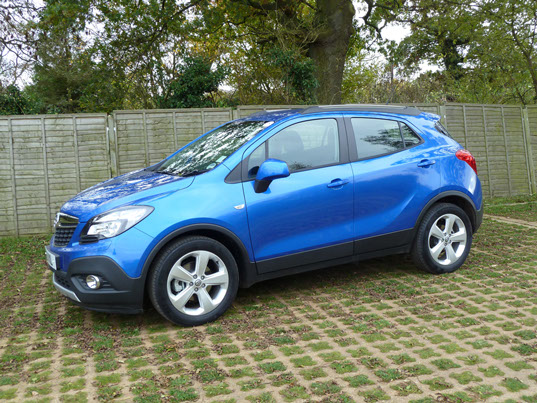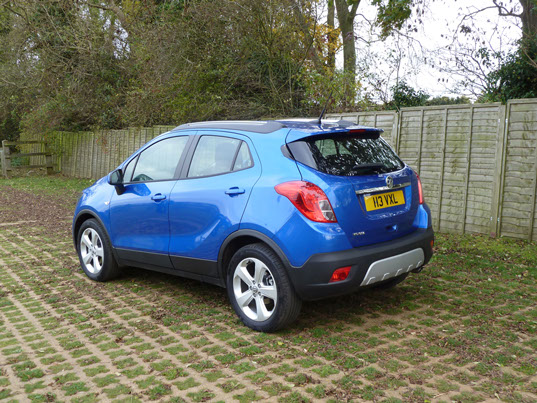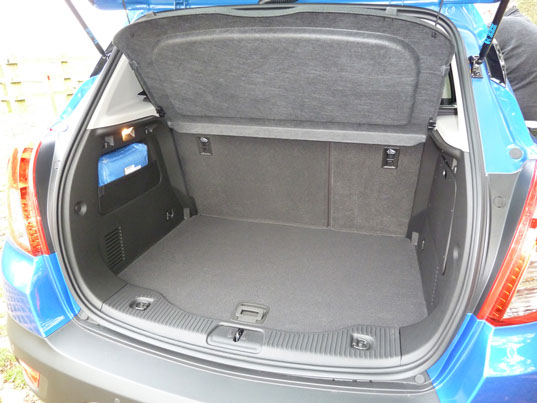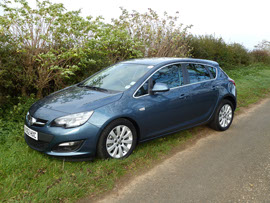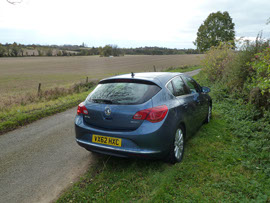Kim Henson is your guide to a selection of the latest Vauxhall models…
The new Vauxhall Mokka
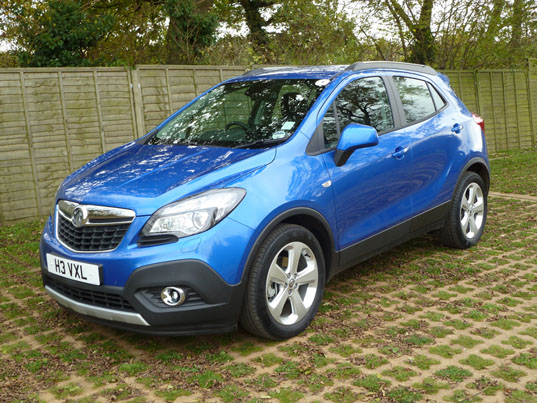
Vauxhall’s recently-introduced and distinctively-styled Mokka is part of the company’s continuing revolution in its model line-up, and represents its first steps into the increasingly popular compact SUV (Sports Utility Vehicle) market. So the new car will be fighting for sales against the likes of established models, including Nissan’s Juke and Qashqai, plus the Skoda Yeti.
It should be mentioned that Vauxhall is no stranger to SUV production, with previous larger models including the Frontera (1991), Monterey (1992) and Antara ‘crossover’ (introduced in 2006 and extensively revised in 2011).
With Mokka prices starting at £15,995, four trim levels (S, Exclusiv, Tech Line and SE) and, from launch, a choice of two petrol engines (1.6 litre naturally-aspirated, or 1.4 litre turbocharged), or a diesel (1.7 CDTi), there is plenty of choice for buyers (it is estimated that three quarters of these will be private purchasers).
It is expected that just over 50 per cent of buyers will choose two wheel drive Mokkas (with only the front wheels being driven). For those preferring the reassurance of four wheel drive, the intelligent all-wheel drive system which responds automatically to prevailing driving conditions is attractive. The ground clearance is relatively high, helping when the going gets tough. The newcomer also features a number of electronic systems to assist the driver.
The four wheel drive system incorporates an electro-magnetic multi-plate clutch and a control module (which acts on information received from sensors including the yaw rate, lateral and longitudinal acceleration, steering angle, wheel speed, accelerator position, engine speed and torque output). The system can vary the apportionment of power from front wheel drive only to a 50/50 split between the front and rear axles.
TRIAL RUN
Over an hour-long run on a range of normal roads (so there was no opportunity on this occasion for off-road testing), I recently sampled the 1.6 litre petrol version (115PS), in Tech Line form, with a five speed manual gearbox and engine stop/start fuel-saving technology. Priced at £15,995 (before any options are added) this version incorporates a switchable Electronic Stability Programme (ESP), traction control, a descent control system, and ‘Hill Start Assist’, as well as a wealth of standard safety and convenience features.
With 115 PS and 155 Nm of torque on tap, I found this Mokka was an eager performer. I was also impressed by the supple ride quality (as standard all versions run on 18 inch lightweight aluminium alloy sports wheels), the generous interior and cargo space, and the vehicle’s good road manners.
The claimed ‘Combined’ fuel consumption is 43.5 mpg.
One aspect at which I was a little surprised was the vehicle’s relatively low gearing. At 70 mph the tachometer was indicating 3,300 rpm, which these days is a fairly high engine speed for motorway cruising. My motoring writer colleague with whom I was sharing the car during my test drive felt the same as I did – that an ‘extra higher gear’ would have been welcome.
Nonetheless, overall I found this new Vauxhall to be likeable and competent.
WHEELS-ALIVE TECH. SPEC. IN BRIEF
Vauxhall Mokka 1.6 16v (petrol) Tech Line
Engine: 1598cc four cylinder, with stop/start technology
Power: 115 PS @ 6,000 rpm
Torque: 155 Nm @ 4,000 rpm
0-62 mph: 12.3 sec
Top speed: 108 mph
Fuel consumption:
‘Urban’: 33.6 mpg
‘Extra Urban’: 52.3 mpg
‘Combined’: 43.5 mpg
CO2 emissions: 153 g/km
‘ON THE ROAD’ PRICE:
Mokka prices start at £15,995 (1.6 Tech Line) and run to £22,945 (1.7 SE diesel automatic).
Vauxhall Astra Biturbo
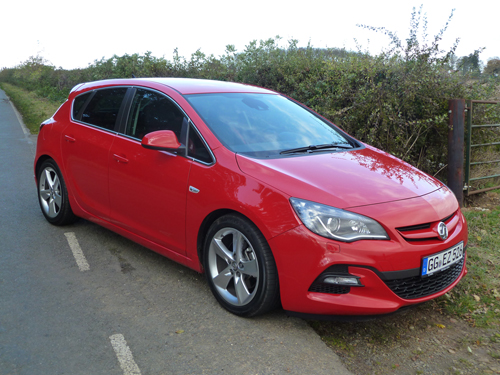
The latest line-up of Astras has already drawn praise for the cars’ attractive styling, and they offer a wide range of performance levels, through a variety of different engines.
However, for those who still believe that diesels generally are dull and relatively slow, I suggest taking to the wheel of the most powerful diesel Astra yet produced, the 195 PS 2.0CDTi BiTurbo – and prepare to be very pleasantly surprised.
I was briefly able to try a left-hand drive hatchback version (one of the first BiTurbos in this country) on a twisting route on typical ‘A’ and ‘B’ roads, and was delighted by the car’s hugely enjoyable performance, complemented by excellent handling and a supple ride quality.
With 195PS available, plus, equally importantly, a vast amount (400Nm) of torque, the twin turbocharger 2.0 litre diesel engine responded instantly to commands from the accelerator pedal. Yet despite the excellent performance potential, this car proved to be as docile as could be when tootling along in slow-moving traffic.
Helping provide the superb responsiveness so evident when driving this car are two turbochargers of different sizes. The smaller unit builds up high pressure with a small quantity of exhaust gas, to provide lag-free acceleration from low engine speeds, and it works on its own at up to 1,500 rpm. Between this speed and 2,500 rpm, both turbos work together, and from 3,000 rpm and higher speeds, the larger unit works alone.
Despite the high power output and performance potential of this car, it’s economical and produces relatively low emissions. In GTC form it will scoot from rest to 60 mph in under eight seconds, and has a top speed of over 135 mph. Yet it is said to have a ‘Combined’ fuel consumption figure of 57.7 mpg, and CO2 emissions are just 129 g/km. Those figures really are impressive, in a car that is so much fun to drive.
The BiTurbo joins the Astra line-up priced at £23,925 for the GTC version. Vauxhall claims that the GTC and Hatchback BiTurbos undercut the prices of their rivals by approximately £1,500.
It’s interesting to note that the Sports Tourer version is the most powerful estate car in its class…
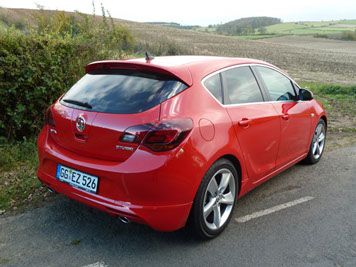
The new Vauxhall ADAM
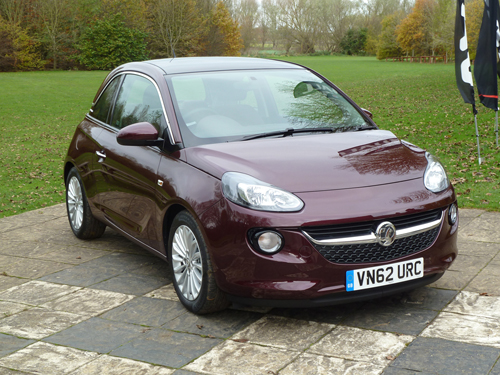
I was recently able to have a quick look at a static pre-production exhibit of Vauxhall’s new ADAM. I feel that this characterful, compact newcomer is a good looker, with much charm and the promise of a wealth of individualistic touches which can be ordered by buyers seeking a unique car.
The ADAM is the result of an investment of some 190 billion Euros, and is packed with clever technologies, including the ‘Intellilink’ infotainment system, claimed by Vauxhall to make it the ‘best connected small car’.
As I write I have just been informed that the first ADAM rolled off the production line at Eisenach on 10th January 2013, and at that time more than 16,000 orders had already been received for the new car, from around Europe.
This will be a very important model for the company.
Incidentally, when the car goes on sale in Britain in the spring of 2013, it will be sold with Vauxhall’s ‘Lifetime’ Warranty’.
More current Vauxhalls…
A few weeks ago (towards the end of 2012) I was also able to take the opportunity of briefly re-acquainting myself with a selection of other current production Vauxhalls, on short test runs…
Vauxhall Astra 1.7 CDTi 16v Tech Line Hatchback
Smart, comfortable, good to drive and with the promise of excellent fuel consumption (official ‘Combined’ figure of 76.3 mpg).
On-the-road price: £19,935.
Vauxhall Astra 1.7 CDTi 16v Tech Line Sports Tourer
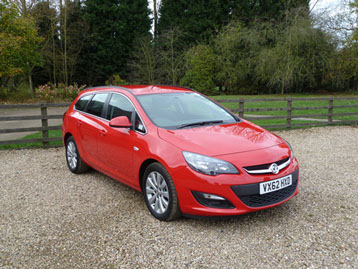
This version of the Astra has particularly smooth styling for an estate, together with a spacious load bay, plus all the dynamic attributes of the hatchback, while offering a ‘Combined’ consumption figure of 70.6 mpg.
At 60 mph in top (6th) gear, the engine is spinning at just 1,500 rpm and sipping fuel. However, when prompted by a gentle dab on the accelerator pedal, the test car responded in lively fashion, and I found it was an enjoyable car to drive.
On-the-road price: £20,955.
NEW ENGINES…
It has just been announced (at the end of 2012) that Vauxhall’s 1.7 litre diesel engines are being replaced by new 1.6 litre ECOTEC turbo-diesel units, which will also be used in place of some of the existing lower powered 2.0 litre models.
The new, ‘Euro 6’ emissions compliant motors are said to provide class-leading Noise, Vibration and Harshness (NVH) performance, high power and torque, plus low fuel consumption – reduced by up to 10 per cent compared with the outgoing units. It will be interesting to try these new engines.
INSIGNIA VXR
Vauxhall has recently introduced the Insignia VXR Supersport, priced at £29,995 (and therefore £3,760 less than the model it replaced…). With a 2.8 litre V6 Turbo ECOTEC engine developing 325 PS, the newcomer has a top speed potential of 170 mph, making it the fastest and most powerful UK production car costing less than £30,000.
This new model follows in the footsteps of iconic sporting Vauxhalls through the ages, including the C10 ‘Prince Henry’ (introduced more than 100 years ago), through the 30-98 (the UK’s first 100 mph production car), and the Lotus Carlton of 1989 (top speed 176 mph – making this the world’s fastest production saloon car at that time).
